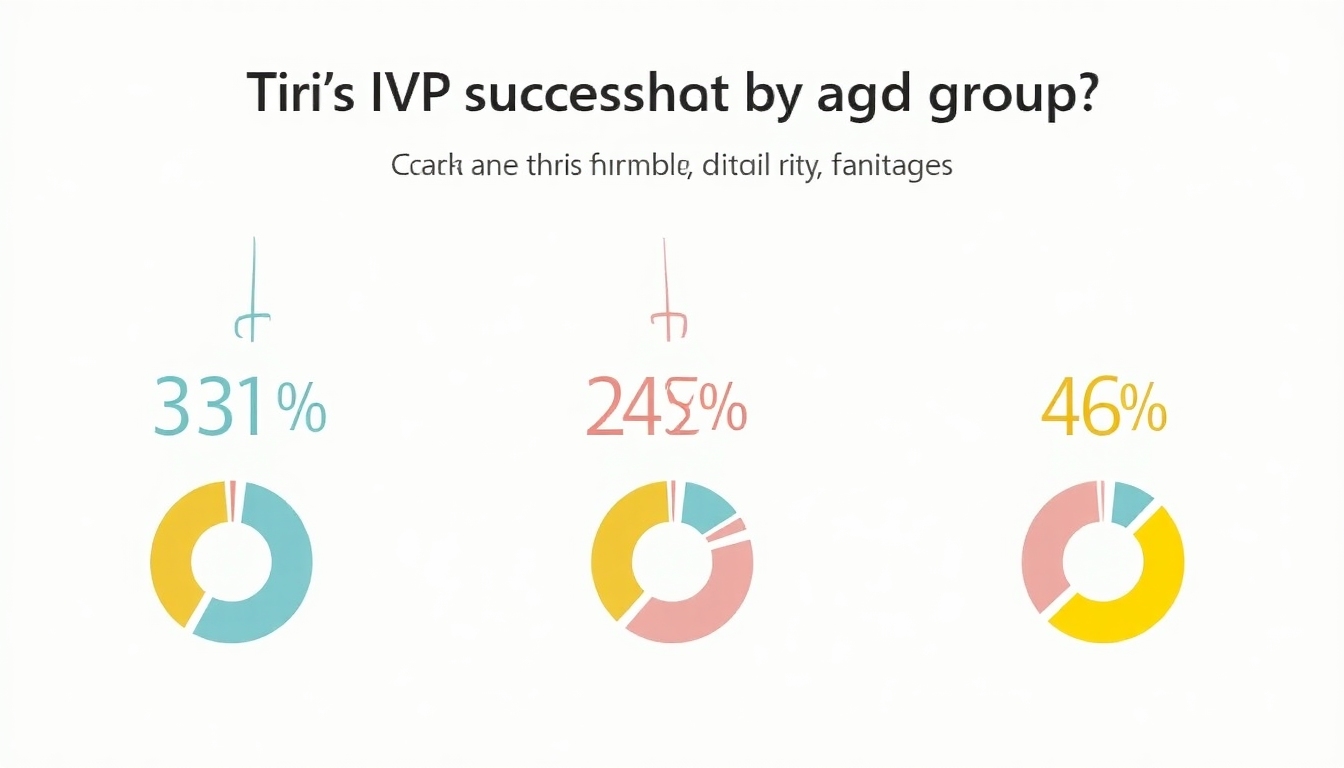Fertility Specialist Success Rates: Your Essential Guide
May 10, 2025, 5:25 p.m.
Overview
Understanding the success rates of fertility specialists is crucial for anyone considering fertility treatments. These rates can vary widely depending on several factors, and knowing what to expect can help you make informed decisions about your care.
What Are Success Rates in Fertility Treatments?
Success rates in fertility treatments typically refer to the percentage of patients who achieve a desired outcome, such as a clinical pregnancy or a live birth, after undergoing a specific treatment like in vitro fertilization (IVF). These rates are important because they give patients an idea of what to expect and help them compare different clinics and specialists.
However, it's essential to understand that success rates are not guarantees. They are based on past data and can be influenced by many variables, including the patient's age, the cause of infertility, and the specific treatment protocol used.

Factors Influencing Success Rates
Success rates in fertility treatments are influenced by a variety of factors, and understanding these can help you set realistic expectations.
- Age of the Patient: Age is perhaps the most critical factor. As women age, the quality and quantity of their eggs decline, which can affect the success of treatments. For instance, women under 35 have a higher chance of success with IVF compared to those over 40. According to the Society for Assisted Reproductive Technology (SART), the live birth rate for women under 35 is approximately 41%, while for women aged 41-42, it's about 12%.
- Specific Fertility Issues: The underlying cause of infertility can significantly impact success rates. For example, couples dealing with male factor infertility might have different success rates compared to those with ovulation disorders. Treatments are tailored to address specific issues, and some conditions may be more challenging to treat than others.
- Type of Treatment: Different fertility treatments have varying success rates. In vitro fertilization (IVF) generally has higher success rates than intrauterine insemination (IUI). For instance, the average success rate for IUI is around 10-20% per cycle, while IVF can be up to 40% for women under 35.
- Expertise of the Fertility Specialist: The skill and experience of the fertility specialist can make a significant difference. Specialists who have performed a high volume of procedures and stay updated with the latest advancements in reproductive medicine are likely to have better success rates.
- Clinic's Technology and Protocols: The technology and protocols used by the clinic also play a role. Clinics that invest in state-of-the-art equipment and follow evidence-based practices tend to have higher success rates. Additionally, clinics that offer personalized treatment plans may achieve better outcomes.
Understanding IVF Success Rates
In vitro fertilization (IVF) is a complex process that involves several steps, including ovarian stimulation, egg retrieval, fertilization, and embryo transfer. Success rates for IVF are typically measured by the percentage of cycles that result in a live birth.
The Centers for Disease Control and Prevention (CDC) publishes annual reports on assisted reproductive technology (ART) success rates. According to their data, the average live birth rates per IVF cycle are as follows:
| Age Group | Live Birth Rate |
|---|---|
| Under 35 | 40% |
| 35-37 | 30% |
| 38-40 | 20% |
| 41-42 | 10% |
| Over 42 | 4% |
These rates are averages, and individual clinics may have higher or lower success rates. When researching clinics, it's important to look at their specific data for patients in your age group and with similar fertility issues.
Additionally, success rates can be influenced by the number of embryos transferred, the use of donor eggs or sperm, and other factors. It's crucial to discuss these details with your fertility specialist to understand what to expect.

Choosing a Fertility Specialist
Selecting the right fertility specialist is a crucial step in your fertility journey. Here are some key factors to consider:
- Board Certification: Ensure the specialist is board-certified in reproductive endocrinology and infertility. This certification indicates that they have completed specialized training and passed rigorous exams.
- Experience: Look for a specialist with extensive experience in treating patients with similar fertility issues. Ask about their success rates and how many procedures they perform annually.
- Clinic Success Rates: Compare the clinic's success rates with national averages. However, remember that success rates can be influenced by the types of patients the clinic treats. A clinic that takes on more challenging cases may have lower success rates but could still be the right choice for you.
- Patient Reviews: Read reviews and testimonials from other patients. These can provide insights into the specialist's bedside manner, communication style, and the overall patient experience.
- Communication: Choose a specialist who listens to your concerns, answers your questions, and explains treatment options clearly. Good communication is essential for a positive experience.
- Support Services: Consider whether the clinic offers additional support services, such as counseling, support groups, or financial assistance programs.
To help you evaluate potential specialists, here's a simple checklist:
- Is the specialist board-certified?
- Do they have experience with my specific fertility issue?
- What are the clinic's success rates for patients like me?
- Are there positive patient reviews available?
- Do I feel comfortable communicating with the specialist?
- Does the clinic offer support services?
By carefully considering these factors, you can find a fertility specialist who is the right fit for your needs.
Personal Stories and Experiences
Fertility treatments can be a deeply personal and emotional journey. Here are a couple of stories that illustrate the challenges and triumphs many face:
- Sarah and John: After years of trying to conceive naturally, Sarah and John turned to a fertility specialist. They were diagnosed with unexplained infertility, which can be particularly frustrating. Their specialist recommended IVF, and after two cycles, they were thrilled to welcome their daughter. Sarah reflects, "It was a tough journey, but having a supportive specialist made all the difference."
- Emily: Emily, a single woman in her late 30s, decided to pursue motherhood through donor sperm and IUI. She faced several setbacks, including miscarriages, but her persistence paid off when she finally had a successful pregnancy. "My fertility specialist was my rock," she says. "They guided me through every step and never gave up on me."
These stories highlight the importance of resilience, support, and trusting in the expertise of your fertility specialist. While every journey is unique, knowing that others have faced similar challenges can provide comfort and hope.

Tips for Improving Your Chances
While fertility treatments are primarily medical, there are lifestyle changes and strategies that can support your journey:
- Healthy Diet: Focus on a balanced diet rich in fruits, vegetables, whole grains, and lean proteins. Some studies suggest that a Mediterranean diet may improve fertility.
- Regular Exercise: Aim for moderate exercise, such as walking or yoga, which can help manage stress and maintain a healthy weight.
- Stress Management: Fertility treatments can be stressful, so finding ways to relax is crucial. Consider mindfulness, meditation, or talking to a counselor.
- Avoid Toxins: Limit exposure to environmental toxins, such as pesticides and certain chemicals, which can affect fertility.
- Follow Treatment Plans: Adhere strictly to your specialist's recommendations, including medication schedules and appointment times.
- Consider Complementary Therapies: Some patients find acupuncture or massage helpful, but always discuss these with your specialist first.
- Seek Emotional Support: Join support groups, either in-person or online, to connect with others going through similar experiences.
Remember, while these tips can help, they are not a substitute for professional medical advice. Always consult your fertility specialist before making significant changes.

Common Misconceptions About Fertility Treatments
There are several myths and misconceptions surrounding fertility treatments and success rates. Here are a few to be aware of:
- Myth: Fertility treatments always work on the first try.
- Reality: Many patients require multiple cycles to achieve success. Patience and persistence are often necessary.
- Myth: Success rates are the same for everyone.
- Reality: Success rates vary widely based on individual factors like age and health conditions.
- Myth: Fertility specialists can guarantee a baby.
- Reality: While specialists can provide the best possible care, there are no guarantees in fertility treatments.
- Myth: IVF is the only option.
- Reality: There are many treatment options, and IVF is not always the first or best choice for every patient.
By understanding these misconceptions, you can approach your fertility journey with more realistic expectations.
Summary
Navigating the world of fertility treatments can be overwhelming, but understanding success rates and choosing the right specialist can make a significant difference. Remember that success rates are just one piece of the puzzle; your individual circumstances and the expertise of your specialist are equally important. Stay informed, seek support, and trust in the process.